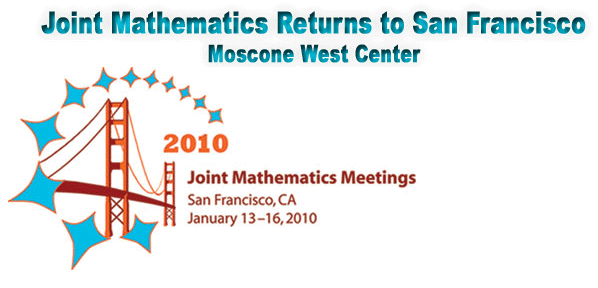For updated locations, click here; All locations are subject to change
Grad School Fair, Friday, 8:30 a.m. - 10:30 a.m. Here is the opportunity for undergrads to meet representatives from mathematical sciences graduate programs from universities all over the country. January is a great time for juniors to learn more, and college seniors may still be able to refine their search. This is your chance for one-stop shopping in the graduate school market. At last year's meeting about 300 students met with representatives from 45 graduate programs. If your school has a graduate program and you are interested in participating, a table will be provided for your posters and printed materials for US$50 (registration for this event must be made by a person already registered for the JMM), and you are welcome to personally speak to interested students. Complimentary coffee will be served. Cosponsored by the AMS and MAA.
Graduate School: Choosing One, Getting In, Staying In, Thursday, 10:40 a.m. - 12:00 noon., organized by Kristi Meyer, Wisconsin Lutheran College, and Aaron Luttman, Clarkson University. With so many graduate school choices and so much information available online, how do you decide on a list of schools to apply to? How can you strengthen your application so you will be accepted into a program? How do you choose which school to attend? And once you've started a program, how do you successfully navigate grad school and complete your degree? Panelists Richard McGehee, University of Minnesota, and Scott Lambert, Colby College, will discuss these and other important issues for those students who are considering a graduate degree or thinking about switching graduate programs. Cosponsored by the MAA and the Young Mathematicians' Network.
Finding a Research Topic and Thesis Advisor, Thursday, 1:00 p.m. - 2:20 p.m., organized by David C. Manderscheid, University of Nebraska-Lincoln, and Aaron Luttman, Clarkson University. Complex analysis, matroid theory, time scale analysis, or mathematical biology? One of the most important and far-reaching decisions that every graduate student in mathematics must make is what direction of mathematical research to pursue and whom to ask to serve as a thesis advisor. Many students are interested in a variety of areas of mathematics, and choosing a singular area of focus can be difficult. Panelists Raegan J. Higgins, Texas Tech University; Franziska Hinckelmann, Virginia Polytechnic Institute and State University; Steven G. Krantz, Washington University; and Jennifer McNulty, University of Montana, four experts in various stages of their mathematical careers, will discuss what factors have influenced their decisions of what research to explore, whom to ask to be their advisor, and whom to take on as graduate students. This panel discussion is aimed at early-career graduate students and undergraduate students who are planning to attend graduate school. Sponsored by the MAA Committee on Graduate Students and the Young Mathematicians' Network.
Low-Dimensional Topology for Fun and Profit, or How to Extract Money from the R4 Space, Thursday, 6:00 p.m. - 7:00 p.m., presented by Cliff Stoll, Acme Klein Bottle Company. For over ten years, Acme Klein Bottle has provided nonorientable manifolds to math folk. Like much of mathematics, it's marginally profitable, but endlessly entertaining. While thousands of computer models of the Klein Bottle populate the Internet, physical models are rarely built. Using Pyrex glass and a torch, we've been able to supply the finite but unbounded demand for one-sided, R3 immersed Klein Bottles. Along the way, we've learned how run a microbusiness within this smallest of niche markets. Our experience may be useful to mathematicians who think about becoming entrepreneurs. So how do you turn your mathematical ideas into a small business? Come to Cliff's talk and find out!
MAA Lecture for Students, Friday, 1:00 p.m. - 1:50 p.m., will be given by David T. Kung, St. Mary's College of Maryland, on How math made modern music mad irrational.
Undergraduate Student Poster Session, Friday, 4:00 p.m. - 5:30 p.m., organized by Diana M. Thomas, Montclair State University. The session is reserved to undergraduates and first-year graduate students submitting posters on work done while undergraduates. Abstracts are accepted on a first-come basis. Space is limited and students are encouraged to apply early. Beginning August 1, 2009, students can submit abstracts online at www.maa.org/students/undergrad/poster09.htm. Examples of poster topics include a new result, a different proof of a known theorem, an innovative solution of a Putnam problem, a new mathematical model, or method of solution of an applied problem. Purely expository posters cannot be accepted. Prizes will be awarded to the top-rated posters with money provided by the AMS, MAA, AWM, CUR, PME, and by the Moore Foundation. Trifold, self-standing 48" by 36" tabletop posterboards will be provided. Additional material or equipment is the responsibility of the presenters. Questions regarding this session should be directed to Diana Thomas at thomasdia@mail.montclair.edu. The deadline for proposals is November 7, 2009. Cosponsored by the MAA-CUPM Subcommittee on Undergraduate Research and the MAA Committee on Undergraduate Student Activities and Chapters (CUSAC).
The schedule is as follows:
- Setup (students only): 12:00 p.m. -1:00 p.m.
- Judging (judges only): 2:30 p.m. - 4:00 p.m.
- Poster session (open to everyone): 4:00 p.m. - 5:30 p.m.
- Location: Room 3001, 3rd Floor, Moscone Center West
Other Events of Interest
- Some more advanced students might be interested in the session on How to Interview for a Job in the Mathematical Sciences, Wednesday at 3:50; see the full description in the MAA Panels, Posters, and Other Sessions section.
- Also see the "Social Events" section for the open hours of the Student Hospitality Center and the Reception for Undergraduates.
